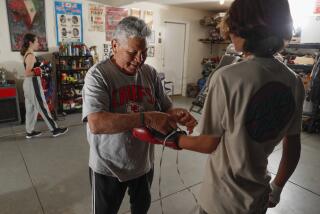Palomino, Muniz took their ring rivalry to a new degree
- Share via
As young fighters trying to make their way in a brutal, demanding discipline, Carlos Palomino and Armando Muniz often were given the same advice:
If you’re serious about boxing, forget about college. And if you’re serious about college, forget about boxing.
Neither paid it any mind.
“It was a dream of mine as a kid to be a boxer,” Muniz says, “but I also knew that I was going to go to school.”
Palomino stayed in school, he says, “because I figured that even if I got lucky and won a world title, athletic careers are pretty short and I’d still have a whole life ahead of me.”
So, even while they continued trading punches, the Southern California-bred fighters never stopped hitting the books.
And when they twice met for the World Boxing Council welterweight championship in the 1970s, they made history: never before had college graduates fought for a world title.
Nor have they since, boxing historians believe.
As longtime boxing writer Bert Sugar notes, “You’re not getting your recruits for boxing from the graduating line at Harvard.”
That’s why, before the first Palomino-Muniz fight, at the Olympic Auditorium on Jan. 21, 1977, Times columnist Jim Murray called the matchup “boxing’s finest intellectual hour since George Bernard Shaw wrote to Gene Tunney” and noted with tongue in cheek, “If the fight is close, maybe they can decide it by debate.”
Palomino, the champion, had only recently earned a degree in recreation administration from Long Beach State.
Muniz, taking his third title shot, had graduated from Cal State Los Angeles, where he majored in Spanish and minored in math, and was working toward a graduate degree in administration.
Neither, however, was a bookworm.
Their first fight, won dramatically by Palomino when he stopped the challenger late in the 15th round, is considered one of the most memorable bouts of 1977.
After 14 rounds, it was even.
In the 15th, “I went out and just threw everything I had for 2 1/2 minutes,” says Palomino, who also won the rematch -- by unanimous decision -- in May 1978. “Finally, he went down.”
Muniz wept when the bout was stopped, believing he’d squandered his last title shot, and rues its ending still.
“I was tired, but I was totally aware,” he says. “I knew Carlos was on top of me and I knew he was trying to knock me down, but I was waiting for one more punch myself. I knew if I threw one more punch straight at him, he was going to go down.”
He never got the chance and less than two years later, after tendinitis in his left arm forced him to quit against Sugar Ray Leonard, Muniz retired with a record of 44-14-1.
Later, after his plan to buy a beer distributorship fell through and he discovered he wasn’t cut out for selling real estate or insurance, he used his degree and turned to teaching.
Last June, the former boxer retired after 21 years of teaching Spanish and math at Riverside Rubidoux High.
“I never thought I’d be a teacher,” says Muniz, who helps run a youth boxing program in Riverside. “I thought, teachers are paid too little. I’ll win the world title and go from there.”
Like Palomino, Muniz was born in Mexico. Both are from big families -- Palomino was the third of 11 children, Muniz the second of eight -- and both fought in the Army at Ft. Bragg, N.C., before going to college. Muniz boxed for the U.S. in the 1968 Olympics. Both fighters say their fathers’ hard-knock lives as laborers motivated their pursuit of higher education.
Today, both are grandfathers.
Muniz is 62, Palomino 59.
“I don’t think going to school affected my fighting at all,” says Muniz, echoing his longtime friend and former rival. “All I needed to be a fighter was time in the morning to jog, time in the afternoon to go to the gym and the dedication to take care of myself.”
He laughs, noting, “I don’t know how in the world I did it.”
Says Palomino, “A lot of people had doubts. My manager told me, ‘You’re not going to be able to do it.’ I said, ‘Just give me a year to see where we’re at.’ In a year, I was 8-0 and carrying 18 units a semester. He said, ‘OK, you’re doing it,’ but I didn’t have much of a life. I trained and went to school.”
Unlike Muniz, Palomino never had to rely on his degree to find work. He successfully defended his title seven times before losing a split decision to Wilfred Benitez in 1979, then launched a career as an actor and pitchman. Including a brief comeback in the late 1990s, he ended his career with a 31-4-3 record.
These days, Palomino owns a credit-card processing company and works with at-risk teens, pushing education.
It’s a subject he and Muniz know well.
“I’m proud to say that Carlos and I were in that fight,” says Muniz, who supplements his pension income as a bail bondsman. “I think the Latino community took it as, ‘Wow, two of our guys are doing this.’ I just wish it would have translated into more kids going into college and getting out of gangs.”
Who’s to say it didn’t?
--
More to Read
Go beyond the scoreboard
Get the latest on L.A.'s teams in the daily Sports Report newsletter.
You may occasionally receive promotional content from the Los Angeles Times.










